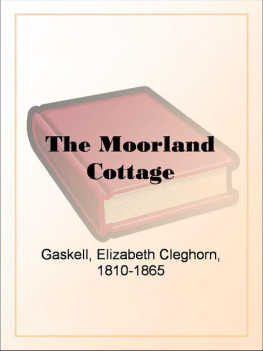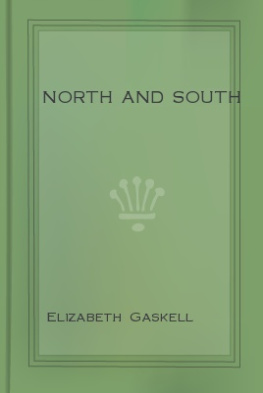Produced by Lazar Liveanu and PG Distributed Proofreaders
THE MOORLAND COTTAGE.
By the author of MARY BARTON.
NEW YORK: 1851.
CHAPTER I.
If you take the turn to the left, after you pass the lyke-gate at Combehurst Church, you will come to the wooden bridge over the brook; keep along the field-path which mounts higher and higher, and, in half a mile or so, you will be in a breezy upland field, almost large enough to be called a down, where sheep pasture on the short, fine, elastic turf. You look down on Combehurst and its beautiful church-spire. After the field is crossed, you come to a common, richly colored with the golden gorse and the purple heather, which in summer-time send out their warm scents into the quiet air. The swelling waves of the upland make a near horizon against the sky; the line is only broken in one place by a small grove of Scotch firs, which always look black and shadowed even at mid-day, when all the rest of the landscape seems bathed in sunlight. The lark quivers and sings high up in the air; too high--in too dazzling a region for you to see her. Look! she drops into sight; but, as if loth to leave the heavenly radiance, she balances herself and floats in the ether. Now she falls suddenly right into her nest, hidden among the ling, unseen except by the eyes of Heaven, and the small bright insects that run hither and thither on the elastic flower-stalks. With something like the sudden drop of the lark, the path goes down a green abrupt descent; and in a basin, surrounded by the grassy hills, there stands a dwelling, which is neither cottage nor house, but something between the two in size. Nor yet is it a farm, though surrounded by living things. It is, or rather it was, at the time of which I speak, the dwelling of Mrs. Browne, the widow of the late curate of Combehurst.
There she lived with her faithful old servant and her only children, a boy and girl. They were as secluded in their green hollow as the households in the German forest-tales. Once a week they emerged and crossed the common, catching on its summit the first sounds of the sweet-toned bells, calling them to church. Mrs. Browne walked first, holding Edward's hand. Old Nancy followed with Maggie; but they were all one party, and all talked together in a subdued and quiet tone, as beseemed the day. They had not much to say, their lives were too unbroken; for, excepting on Sundays, the widow and her children never went to Combehurst. Most people would have thought the little town a quiet, dreamy place; but to those two children if seemed the world; and after they had crossed the bridge, they each clasped more tightly the hands which they held, and looked shyly up from beneath their drooped eyelids when spoken to by any of their mother's friends. Mrs.
Browne was regularly asked by some one to stay to dinner after morning church, and as regularly declined, rather to the timid children's relief; although in the week-days they sometimes spoke together in a low voice of the pleasure it would be to them if mamma would go and dine at Mr.
Buxton's, where the little girl in white and that great tall boy lived.
Instead of staying there, or anywhere else, on Sundays, Mrs. Browne thought it her duty to go and cry over her husband's grave. The custom had arisen out of true sorrow for his loss, for a kinder husband, and more worthy man, had never lived; but the simplicity of her sorrow had been destroyed by the observation of others on the mode of its manifestation. They made way for her to cross the grass toward his grave; and she, fancying that it was expected of her, fell into the habit I have mentioned. Her children, holding each a hand, felt awed and uncomfortable, and were sensitively conscious how often they were pointed out, as a mourning group, to observation.
"I wish it would always rain on Sundays," said Edward one day to Maggie, in a garden conference.
"Why?" asked she.
"Because then we bustle out of church, and get home as fast as we can, to save mamma's crape; and we have not to go and cry over papa."
"I don't cry," said Maggie. "Do you?"
Edward looked round before he answered, to see if they were quite alone, and then said:
"No; I was sorry a long time about papa, but one can't go on being sorry forever. Perhaps grown-up people can."
"Mamma can," said little Maggie. "Sometimes I am very sorry too; when I am by myself or playing with you, or when I am wakened up by the moonlight in our room. Do you ever waken and fancy you heard papa calling you? I do sometimes; and then I am very sorry to think we shall never hear him calling us again."
"Ah, it's different with me, you know. He used to call me to lessons."
"Sometimes he called me when he was displeased with me. But I always dream that he was calling us in his own kind voice, as he used to do when he wanted us to walk with him, or to show us something pretty."
Edward was silent, playing with something on the ground. At last he looked round again, and, having convinced himself that they could not be overheard, he whispered:
"Maggie--sometimes I don't think I'm sorry that papa is dead--when I'm naughty, you know; he would have been so angry with me if he had been here; and I think--only sometimes, you know, I'm rather glad he is not."
"Oh, Edward! you don't mean to say so, I know. Don't let us talk about him.
We can't talk rightly, we're such little children. Don't, Edward, please."
Poor little Maggie's eyes filled with tears; and she never spoke again to Edward, or indeed to any one, about her dead father. As she grew older, her life became more actively busy. The cottage and small outbuildings, and the garden and field, were their own; and on the produce they depended for much of their support. The cow, the pig, and the poultry took up much of Nancy's time. Mrs. Browne and Maggie had to do a great deal of the house-work; and when the beds were made, and the rooms swept and dusted, and the preparations for dinner ready, then, if there was any time, Maggie sat down to her lessons. Ned, who prided himself considerably on his sex, had been sitting all the morning, in his father's arm-chair, in the little book-room, "studying," as he chose to call it. Sometimes Maggie would pop her head in, with a request that he would help her to carry the great pitcher of water up-stairs, or do some other little household service; with which request he occasionally complied, but with so many complaints about the interruption, that at last she told him she would never ask him again. Gently as this was said, he yet felt it as a reproach, and tried to excuse himself.
"You see, Maggie, a man must be educated to be a gentleman. Now, if a woman knows how to keep a house, that's all that is wanted from her. So my time is of more consequence than yours. Mamma says I'm to go to college, and be a clergyman; so I must get on with my Latin."
Maggie submitted in silence; and almost felt it as an act of gracious condescension when, a morning or two afterwards, he came to meet her as she was toiling in from the well, carrying the great brown jug full of spring-water ready for dinner. "Here," said he, "let us put it in the shade behind the horse-mount. Oh, Maggie! look what you've done! Spilt it all, with not turning quickly enough when I told you. Now you may fetch it again for yourself, for I'll have nothing to do with it."
"I did not understand you in time," said she, softly. But he had turned away, and gone back in offended dignity to the house. Maggie had nothing to do but return to the well, and fill it again. The spring was some distance off, in a little rocky dell. It was so cool after her hot walk, that she sat down in the shadow of the gray limestone rock, and looked at the ferns, wet with the dripping water. She felt sad, she knew not why. "I think Ned is sometimes very cross," thought she. "I did not understand he was carrying it there. Perhaps I am clumsy. Mamma says I am; and Ned says I am. Nancy never says so and papa never said so. I wish I could help being clumsy and stupid. Ned says all women are so. I wish I was not a woman. It must be a fine thing to be a man. Oh dear! I must go up the field again with this heavy pitcher, and my arms do so ache!" She rose and climbed the steep brae. As she went she heard her mother's voice.
Next page






